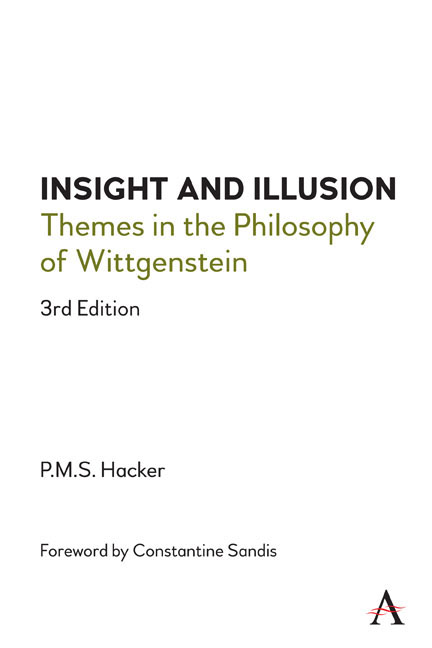Book contents
- Frontmatter
- Dedication
- Contents
- FOREWORD
- PREFACE TO THE REVISED EDITION
- PREFACE TO THE FIRST EDITION
- LIST OF ABBREVIATIONS
- I WITTGENSTEIN’S EARLY CONCEPTION OF PHILOSOPHY
- II THE DIALOGUE WITH FREGE AND RUSSELL
- III MEANING, METAPHYSICS, AND THE MIND
- IV EMPIRICAL REALISM AND TRANSCENDENTAL SOLIPSISM
- V DISINTEGRATION AND RECONSTRUCTION
- VI WITTGENSTEIN’S LATER CONCEPTION OF PHILOSOPHY
- VII METAPHYSICS AS THE SHADOW OF GRAMMAR
- VIII THE REFUTATION OF SOLIPSISM
- IX PRIVATE LINGUISTS AND PUBLIC SPEAKERS
- X ‘A CLOUD OF PHILOSOPHY CONDENSED INTO A DROP OF GRAMMAR’
- XI CRITERIA, REALISM AND ANTI-REALISM
- INDEX
XI - CRITERIA, REALISM AND ANTI-REALISM
Published online by Cambridge University Press: 24 February 2022
- Frontmatter
- Dedication
- Contents
- FOREWORD
- PREFACE TO THE REVISED EDITION
- PREFACE TO THE FIRST EDITION
- LIST OF ABBREVIATIONS
- I WITTGENSTEIN’S EARLY CONCEPTION OF PHILOSOPHY
- II THE DIALOGUE WITH FREGE AND RUSSELL
- III MEANING, METAPHYSICS, AND THE MIND
- IV EMPIRICAL REALISM AND TRANSCENDENTAL SOLIPSISM
- V DISINTEGRATION AND RECONSTRUCTION
- VI WITTGENSTEIN’S LATER CONCEPTION OF PHILOSOPHY
- VII METAPHYSICS AS THE SHADOW OF GRAMMAR
- VIII THE REFUTATION OF SOLIPSISM
- IX PRIVATE LINGUISTS AND PUBLIC SPEAKERS
- X ‘A CLOUD OF PHILOSOPHY CONDENSED INTO A DROP OF GRAMMAR’
- XI CRITERIA, REALISM AND ANTI-REALISM
- INDEX
Summary
The Origins of the Idea
In Chapter V it was noted that in the Philosophical Remarks,during Wittgenstein's brief verificationist phase, he distinguished between ‘genuine propositions’ and ‘hypotheses'. Genuine propositions, he argued, are sense-datum statements that are immediately and conclusively verified by reference to current experiences, compared directly with reality for their truth. Hypotheses (e.g. statements about material objects, the past or future, laws of nature) are not propositions in this sense, but quite different kinds of grammatical structures. They are not conclusively verifiable at all, not compared directly with reality for their truth. They are supported by evidence, viz. ‘symptoms', although no accumulation of such evidential support will render a hypothesis certain. So it makes no sense to talk of a hypothesis as certain. Symptoms stand to the hypothesis they support as points on a curve to a curve. The symptoms/hypothesis relation is grammatical not empirical (inductive). For that certain symptoms probabilify a hypothesis partially determines the meaning of the hypothesis. Since any set of symptoms falls short of entailing the hypothesis, the evidential support it gives is defeasible. For addition of further genuine propositions to the set of symptoms for a given hypothesis may undermine the plausibility of the hypothesis.
We saw that Wittgenstein rapidly abandoned this conception. He came to think that what he had conceived of as ‘genuine propositions’ are notcompared with reality for truth and falsehood. There is no verificationof i have toothache’ or ‘A looks red to me', and the role of such expressions is not to describehow things are. Such ‘propositions', far from being known with certainty, cannot be said to be knownat all. Similarly, propositions such as ‘This poppy is red', ‘The book is on the table’ cannot be said to be hypotheses if that means that they are at best merely probable or that they cannot be conclusively verified. It only makes sense to talk of something's being probable where it also makes sense for it to be certain.
As the symptom/hypothesis relation disappears from Wittgenstein's writings in 1932/33 we find the first occurrences of the term ‘criterion'. It crops up initially in contexts in which emphasis is being given to verification. A statement gets its sense, Wittgenstein argued at this stage, from its verification (AWL,p. 17).
- Type
- Chapter
- Information
- Insight and IllusionThemes in the Philosophy of Wittgenstein, pp. 307 - 336Publisher: Anthem PressPrint publication year: 2021

